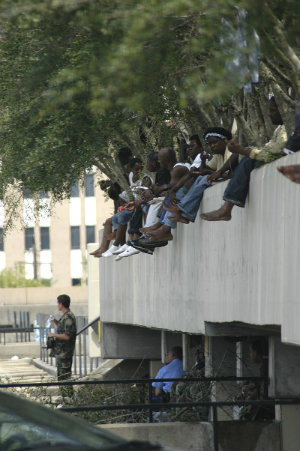Summary | Excerpt | Reviews | Beyond the Book | Read-Alikes | Genres & Themes | Author Bio

This article relates to The Floating World
New Orleans was, and is, a city with a majority African-American population (nearly 67% in 2005), and the racial implications of the government's response to Hurricane Katrina have come to define the way many people think of the storm. 68% of the storm's nearly 700 victims were black, as were an overwhelming number of those whose homes were destroyed and who sought refuge in the Superdome shortly after the storm made landfall. The areas most susceptible to flooding were (and are still) largely populated by poor African Americans, as was the case with one of the hardest hit neighborhoods, the Lower Ninth Ward. Many residents were unable to evacuate in advance of the storm due to a lack of financial resources, and because traffic out of the city was at a standstill.
 As described in The Floating World, the National Guard (and private security forces) patrolled neighborhoods, pursuing an attempt at law and order with undeniable racial undertones. One National Guard commander was quoted as saying, "This place is going to look like Little Somalia...We're going to go out and take this city back." The press perpetuated this racist narrative with rumors and hearsay regarding violence and looting in the city. Images depicting African Americans removing food from a grocery store were accompanied by headlines about "looting," while white people depicted doing the same were described as "finding supplies."
As described in The Floating World, the National Guard (and private security forces) patrolled neighborhoods, pursuing an attempt at law and order with undeniable racial undertones. One National Guard commander was quoted as saying, "This place is going to look like Little Somalia...We're going to go out and take this city back." The press perpetuated this racist narrative with rumors and hearsay regarding violence and looting in the city. Images depicting African Americans removing food from a grocery store were accompanied by headlines about "looting," while white people depicted doing the same were described as "finding supplies."
The erroneous hysteria in the media was largely responsible for the delayed deployment of Red Cross responders, as descriptions of looting and violence in the wake of the storm made the city sound like a dangerous war zone with criminals running amok. Meanwhile the conditions in the Superdome quickly became catastrophic, as food and medical care were in short supply, and efforts at sanitation were inadequate. One FEMA worker described it in a deposition before Congress as a "cesspool of human waste and filth," and "inhumane."
 There were several brutal incidents involving the New Orleans police department, which had already developed a reputation for corruption and racial profiling prior to the storm. On September 1, 2005, police blockaded the Crescent City Connection bridge and turned back New Orleans citizens attempting to flee into (predominantly white) neighboring Gretna, firing their weapons into the air. On September 4, police killed two and injured four on the Danziger Bridge. All of the victims in this incident were black.
There were several brutal incidents involving the New Orleans police department, which had already developed a reputation for corruption and racial profiling prior to the storm. On September 1, 2005, police blockaded the Crescent City Connection bridge and turned back New Orleans citizens attempting to flee into (predominantly white) neighboring Gretna, firing their weapons into the air. On September 4, police killed two and injured four on the Danziger Bridge. All of the victims in this incident were black.
After the storm, FEMA provided temporary housing in the form of trailers for 63% of citizens from the predominantly white neighborhood of St. Bernard's Parish, and only 13% of those from the Lower Ninth Ward. In the eight months following the storm, residents of the Lower Ninth Ward were prohibited from returning home for their possessions, and it took over a year for the neighborhood to have access to adequate drinking water again. While the Lower Ninth Ward has bounced back a little in the decade since the storm, its population is a third of what it was before Hurricane Katrina hit in 2005.
Rapper Kanye West famously stated during a Katrina relief concert that "George Bush doesn't care about black people." The artist's expression of frustration continues to be a cultural touchstone and shorthand phrase for the racial implications of the storm's aftermath. The government's response to the storm is considered by many to be indicative of systemic racist beliefs and policies in the United States.
Picture of flooded highways by U.S. Coast Guard, Petty Officer 2nd Class Kyle Niemi
Picture of residents anxiously waiting outside Superdome by Airman Jeremy L. Grisham
Filed under Society and Politics
![]() This "beyond the book article" relates to The Floating World. It originally ran in November 2017 and has been updated for the
October 2018 paperback edition.
Go to magazine.
This "beyond the book article" relates to The Floating World. It originally ran in November 2017 and has been updated for the
October 2018 paperback edition.
Go to magazine.
There is no such thing as a moral or immoral book. Books are either well written or badly written. That is all.
Click Here to find out who said this, as well as discovering other famous literary quotes!
Your guide toexceptional books
BookBrowse seeks out and recommends the best in contemporary fiction and nonfiction—books that not only engage and entertain but also deepen our understanding of ourselves and the world around us.